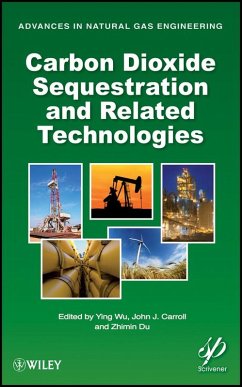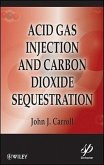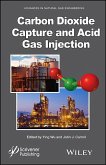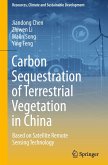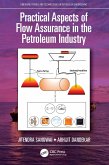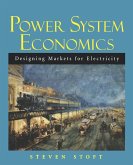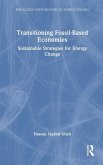Carbon Dioxide Sequestration and Related Technologies
Herausgeber: Wu, Ying; Du, Zhimin; Carroll, John J
Carbon Dioxide Sequestration and Related Technologies
Herausgeber: Wu, Ying; Du, Zhimin; Carroll, John J
- Gebundenes Buch
- Merkliste
- Auf die Merkliste
- Bewerten Bewerten
- Teilen
- Produkt teilen
- Produkterinnerung
- Produkterinnerung
Carbon dioxide sequestration is a technology that is being explored to curb the anthropogenic emission of CO2 into the atmosphere. Carbon dioxide has been implicated in the global climate change and reducing it is a potential solution.
The injection of carbon dioxide for enhanced oil recovery (EOR) has the duel benefit of sequestering the CO2 and extending the life of some older fields. Sequestering CO2 and EOR have many shared elements that make them comparable.
This volume presents some of the latest information on these processes covering physical properties, operations, design,…mehr
Andere Kunden interessierten sich auch für
![Acid Gas Injection and Carbon Dioxide Sequestration Acid Gas Injection and Carbon Dioxide Sequestration]() John J CarrollAcid Gas Injection and Carbon Dioxide Sequestration222,99 €
John J CarrollAcid Gas Injection and Carbon Dioxide Sequestration222,99 €![Carbon Dioxide Capture and Acid Gas Injection Carbon Dioxide Capture and Acid Gas Injection]() Carbon Dioxide Capture and Acid Gas Injection231,99 €
Carbon Dioxide Capture and Acid Gas Injection231,99 €![Carbon Sequestration of Terrestrial Vegetation in China Carbon Sequestration of Terrestrial Vegetation in China]() Jiandong ChenCarbon Sequestration of Terrestrial Vegetation in China77,99 €
Jiandong ChenCarbon Sequestration of Terrestrial Vegetation in China77,99 €![Environmental Impacts of Hydraulic Fracturing Environmental Impacts of Hydraulic Fracturing]() Frank R SpellmanEnvironmental Impacts of Hydraulic Fracturing144,99 €
Frank R SpellmanEnvironmental Impacts of Hydraulic Fracturing144,99 €![Practical Aspects of Flow Assurance in the Petroleum Industry Practical Aspects of Flow Assurance in the Petroleum Industry]() Jitendra SangwaiPractical Aspects of Flow Assurance in the Petroleum Industry181,99 €
Jitendra SangwaiPractical Aspects of Flow Assurance in the Petroleum Industry181,99 €![Power System Economics Power System Economics]() Steven StoftPower System Economics96,99 €
Steven StoftPower System Economics96,99 €![Transitioning Fossil-Based Economies Transitioning Fossil-Based Economies]() Hassan Qudrat-UllahTransitioning Fossil-Based Economies172,99 €
Hassan Qudrat-UllahTransitioning Fossil-Based Economies172,99 €-
-
-
Carbon dioxide sequestration is a technology that is being explored to curb the anthropogenic emission of CO2 into the atmosphere. Carbon dioxide has been implicated in the global climate change and reducing it is a potential solution.
The injection of carbon dioxide for enhanced oil recovery (EOR) has the duel benefit of sequestering the CO2 and extending the life of some older fields. Sequestering CO2 and EOR have many shared elements that make them comparable.
This volume presents some of the latest information on these processes covering physical properties, operations, design, reservoir engineering, and geochemistry for AGI and the related technologies.
The injection of carbon dioxide for enhanced oil recovery (EOR) has the duel benefit of sequestering the CO2 and extending the life of some older fields. Sequestering CO2 and EOR have many shared elements that make them comparable.
This volume presents some of the latest information on these processes covering physical properties, operations, design, reservoir engineering, and geochemistry for AGI and the related technologies.
Produktdetails
- Produktdetails
- Verlag: John Wiley & Sons / Wiley
- Seitenzahl: 508
- Erscheinungstermin: 5. Juli 2011
- Englisch
- Abmessung: 231mm x 160mm x 33mm
- Gewicht: 862g
- ISBN-13: 9780470938768
- ISBN-10: 0470938765
- Artikelnr.: 33078430
- Herstellerkennzeichnung
- Libri GmbH
- Europaallee 1
- 36244 Bad Hersfeld
- gpsr@libri.de
- Verlag: John Wiley & Sons / Wiley
- Seitenzahl: 508
- Erscheinungstermin: 5. Juli 2011
- Englisch
- Abmessung: 231mm x 160mm x 33mm
- Gewicht: 862g
- ISBN-13: 9780470938768
- ISBN-10: 0470938765
- Artikelnr.: 33078430
- Herstellerkennzeichnung
- Libri GmbH
- Europaallee 1
- 36244 Bad Hersfeld
- gpsr@libri.de
Ying (Alice) Wu is currently the President of Sphere Technology Connection Ltd. (STC) in Calgary, Canada. From 1983 to 1999 she was an Assistant Professor and Researcher at Southwest Petroleum Institute (now Southwest Petroleum University, SWPU) in Sichuan, China. She received her MSc in Petroleum Engineering from the SWPU and her BSc in Petroleum Engineering from Daqing Petroleum University in Heilongjiang, China. John J. Carroll, PhD, PEng is the Director, Geostorage Process Engineering for Gas Liquids Engineering, Ltd. in Calgary, Canada. Dr. Carroll holds bachelor and doctoral degrees in chemical engineering from the University of Alberta, Edmonton, Canada, and is a registered professional engineer in the provinces of Alberta and New Brunswick in Canada. His fist book, Natural Gas Hydrates: A Guide for Engineers, is now in its second edition, and he is the author or co-author of 50 technical publications and about 40 technical presentations.
Introduction
The Three Sisters - CCS, AGI, and EOR xix
Ying Wu, John J. Carroll and Zhimin Du
Section 1: Data and Correlation
1. Prediction of Acid Gas Dew Points in the Presence of Water and Volatile
Organic Compounds 3
Ray. A. Tomcej
1.1 Introduction 3
1.2 Previous Studies 4
1.3 Thermodynamic Model 5
1.4 Calculation Results 6
1.5 Discussion 10
2. Phase Behavior of China Reservoir Oil at Different C02 Injected
Concentrations 13
Fengguang Li, Xin Yang, Changyu Sun, and Guangjin Chen
2.1 Introduction 14
2.2 Preparation of Reservoir Fluid 14
2.3 PVT Phase Behavior for the C02 Injected Crude Oil 15
2.4 Viscosity of the C02 Injected Crude Oil 17
2.5 Interfacial Tension for C02 Injected Crude Oil/Strata Water 19
2.6 Conclusions 20
3. Viscosity and Density Measurements for Sour Gas Fluids at High
Temperatures and Pressures 23
B.R. Giri, P. Biais and R.A. Marriott
3.1 Introduction 24
3.2 Experimental 25
3.3 Results 31
3.4 Conclusions 37
4. Acid Gas Viscosity Modeling with the Expanded Fluid Viscosity
Correlation 41
H. Motahhari, M.A. Satyro, H.W. Yarranton
4.1 Introduction 41
4.2 Expanded Fluid Viscosity Correlation 42
4.3 Results and Discussion 47
4.4 Conclusions 52
4.5 Acknowledgements 52
5. Evaluation and Improvement of Sour Property Packages in Unisim Design 55
Jianyong Yang, Ensheng Zhao, Laurie Wang, and Sanjoy Saha
5.1 Introduction 55
5.2 Model Description 56
5.3 Phase Equilibrium Calculation 58
5.4 Conclusions 62
5.5 Future Work 62
6. Compressibility Factor of High C02-Content Natural Gases: Measurement
and Correlation 65
Xiaoqiang Bian, Zhimin Du, Yong Tang, and Jianfen Du
6.1 Introduction 65
6.2 Experiment 67
6.3 Methods 68
6.5 Comparison of the Proposed Method and Other Methods 78
6.6 Conclusions 83
6.7 Acknowledgements 84
6.8 Nomenclature 84
Section 2: Process Engineering
7. Analysis of Acid Gas Injection Variables 89
Edward Wiehert and James van der Lee
7.1 Introduction 89
7.2 Discussion 90
7.3 Program Design 93
7.4 Results 94
7.5 Discussion of Results 96
7.6 Conclusion 105
8. Glycol Dehydration as a Mass Transfer Rate Process 107
Nathan A. Hatcher, Jaime L. Nava and Ralph H. Weiland
8.1 Phase Equilibrium 108
8.2 Process Simulation 110
8.3 Dehydration Column Performance 111
8.4 Stahl Columns and Stripping Gas 114
8.5 Interesting Observations from a Mass Transfer Rate Model 115
8.6 Factors That Affect Dehydration of Sweet Gases 118
8.7 Dehydration of Acid Gases 119
8.8 Conclusions 119
9. Carbon Capture Using Amine-Based Technology 121
Ben Spooner and David Engel
9.1 Amine Applications 121
9.2 Amine Technology 122
9.3 Reaction Chemistry 124
9.4 Types of Amine 126
9.5 Challenges of Carbon Capture 128
9.6 Conclusion 131
10. Dehydration-through-Compression (DTC): Is It Adequate? A Tale of Three
Gases 133
Wes H. Wright
10.1 Background 133
10.2 Water Saturation 138
10.3 Is It Adequate? 138
10.4 The Gases 141
10.5 Results 147
10.6 Discussion 151
11. Diaphragm Pumps Improve Efficiency of Compressing Acid Gas and C02 155
Josef Jarosch, Anke-Dorothee Braun
11.1 Diaphragm Pumps 162
11.2 Acid Gas Compression 164
11.3 C02 Compression for Sequestration 167
11.4 Conclusion 171
Section 3: Reservoir Engineering
12. Acid Gas Injection in the Permian and San Juan Basins: Recent Case
Studies from New Mexico 175
David T. Lescinsky; Alberto A. Gutierrez, RG; James C. Hunter, RG; Julie W.
Gutierrez; and Russell E. Bentley
12.1 Background 175
12.2 AGI Project Planning and Implementation 178
12.3 AGI Projects in New Mexico 190
12.4 AGI and the Potential for Carbon Credits 204
12.5 Conclusions 207
13. C02 and Acid Gas Storage in Geological Formations as Gas Hydrate 209
Farhad Qanbari, Olga Ye Zatsepina, S. Hamed Tabatabaie, Mehran
Pooladi-Darvish
13.1 Introduction 210
13.2 Geological Settings 211
13.3 Model Parameters 216
13.4 Results 218
13.5 Discussion 221
13.6 Conclusions 223
13.7 Acknowledgment 224
14. Complex Flow Mathematical Model of Gas Pool with Sulfur Deposition 227
W. Zhu, Y. Long, Q. Liu, Y. Ju, and X. Huang
14.1 Introduction 227
14.2 The Mathematical Model of Multiphase Complex Flow 228
14.3 Mathematical Models of Flow Mechanisms 232
14.4 Solution of the Mathematical Model Equations 238
14.5 Example 240
14.6 Conclusions 242
14.7 Acknowledgement 242
Section 4: Enhanced Oil Recovery (EOR)
15. Enhanced Oil Recovery Project: Dunvegan C Pool 247
Darryl Burns
15.1 Introduction 248
15.2 Pool Data Collection 249
15.3 Pool Event Log 252
15.4 Reservoir Fluid Characterization 255
15.5 Material Balance 263
15.6 Geological Model 264
15.7 Geological Uncertainty 269
15.8 History Match 272
15.9 Black Oil to Compositional Model Conversion 282
15.10 Recovery Alternatives 290
15.11 Economics 307
15.12 Economic Uncertainty 312
15.13 Discussion and Learning 312
15.14 End Note 317
16. C02 Flooding as an EOR Method for Low Permeability Reservoirs 319
Yongle Hu, Yunpeng Hu, Qin Li, Lei Huang, Mingqiang Hao, and Siyu Yang
16.1 Introduction 319
16.2 Field Experiment of C02 Flooding in China 320
16.3 Mechanism of C02 Flooding Displacement 321
16.4 Perspective 324
16.5 Conclusion 326
17. Pilot Test Research on C02 Drive in Very Low Permeability Oil Field of
in Daqing Changyuan 329
Weiyao Zhu, Jiecheng Cheng, Xiaohe Huang, Yunqian Long, and Y. Lou
17.1 Introduction 329
17.2 Laboratory Test Study on C02 Flooding in Oil Reservoirs with Very Low
Permeability 330
17.3 Field Testing Research 333
17.4 Conclusion 346
17.5 Acknowledgement 349
18. Operation Control of C02-Driving in Field Site. Site Test in Wellblock
Shu 101, Yushulin Oil Field, Daqing 351
Xinde Wan, Tao Sun, Yingzhi Zhang, Tiejun Yang, and Changhe Mu
18.1 Test Area Description 352
18.2 Test Effect and Cognition 353
18.3 Conclusions 359
19. Application of Heteropolysaccharide in Acid Gas Injection 361
Jie Zhang, Gang Guo and Shugang Li
19.1 Introduction 361
19.2 Application of Heteropolysaccharide in C02 Reinjection Miscible Phase
Recovery 363
19.3 Application of Heteropolysaccharide in H2S Reinjection formation 370
19.4 Conclusions 373
Section 5: Geology and Geochemistry
20. Impact of S02 and NO on Carbonated Rocks Submitted to a Geological
Storage of C02: An Experimental Study 377
Stéphane Renard, Jérôme Sterpenich, Jacques Pironon, Aurélien Randi, Pierre
Chiquet and Marc Lescanne
20.1 Introduction 377
20.2 Apparatus and Methods 378
20.3 Results and Discussion 381
20.4 Conclusion 391
21. Geochemical Modeling of Huff 'N' Puff Oil Recovery With C02 at the
Northwest Mcgregor Oil Field 393
Yevhen I. Holubnyak, Blaise A.F. Mibeck, Jordan M. Bremer, Steven A. Smith,
James A. Sorensen, Charles D. Gorecki, Edward N. Steadman, and John A.
Harju
21.1 Introduction 393
21.2 Northwest McGregor Location and Geological Setting 395
21.3 The Northwest McGregor Field, E. Goetz #1 Well Operational History 395
21.4 Reservoir Mineralogy 397
21.5 Preinjection and Postinjection Reservoir Fluid Analysis 398
21.6 Major Observations and the Analysis of the Reservoir Fluid Sampling
400
21.7 Laboratory Experimentations 401
21.8 2-D Reservoir Geochemical Modeling with GEM 402
21.9 Summary and Conclusions 403
21.10 Acknowledgments 404
21.11 Disclaimer 404
22. Comparison of C02 and Acid Gas Interactions with reservoir fluid and
Rocks at Williston Basin Conditions 407
Yevhen I. Holubnyak, Steven B. Hawthorne, Blaise A. Mibeck, David J.
Miller, Jordan M. Bremer, Steven A. Smith, James A. Sorensen, Edward N.
Steadman, and John A. Harju
22.1 Introduction 407
22.2 Rock Unit Selection 409
22.3 C02 Chamber Experiments 411
22.4 Mineralogical Analysis 412
22.5 Numerical Modeling 413
22.6 Results 413
22.7 Carbonate Minerals Dissolution 414
22.8 Mobilization of Fe 416
22.9 Summary and Suggestions for Future Developments 418
22.10 Acknowledgments 418
22.11 Disclaimer 418
Section 6: Well Technology
23 Well Cement Aging in Various H2S-C02 Flui( is at High Pressure and High
Temperature: Experiments and Modelling 423
Nicolas Jacquemet, Jacques Pironon, Vincent Lagneau, Jérémie Saint-Marc
23.1 Introduction 424
23.2 Experimental equipment 425
23.3 Materials, Experimental Conditions and Analysis 426
23.4 Results and Discussion 428
23.5 Reactive Transport Modelling 430
23.6 Conclusion 432
24. Casing Selection and Correlation Technology for Ultra-Deep, Ultra- High
Pressure, High H2S Gas Wells 437
Yongxing Sun, Yuanhua Lin, Taihe Shi, Zhongsheng Wang, Dajiang Zhu, Liping
Chen, Sujun Liu, and Dezhi Zeng
24.1 Introduction 438
24.2 Material Selection Recommended Practice 438
24.3 Casing Selection and Correlation Technology 441
24.4 Field Applications 443
24.4 Conclusions 445
24.5 Acknowledgments 447
25. Coupled Mathematical Model of Gas Migration in Cemented Annulus with
Mud Column in Acid Gas Well 449
Hongjun Zhu, Yuanhua Lin, Yongxing Sun, Dezhi Zeng, Zhi Zhang, and Taihe
Shi
25.1 Introduction 449
25.2 Coupled Mathematical Model 450
25.3 Illustration 458
25.4 Conclusions 459
25.5 Nomenclature 460
25.6 Acknowledgment 461
Section 7: Corrosion
26. Study on Corrosion Resistance of L245/825 Lined Steel Pipe Welding Gap
in H2S+C02 Environment 465
Dezhi Zeng, Yuanhua Lin, Liming Huang, Daijiang Zhu, Tan Gu, Taihe Shi, and
Yongxing Sun
26.1 Introduction 466
26.2 Welding Process of Lined Steel Pipe 466
26.3 Corrosion Test Method of Straight and Ring Welding Gaps of L245/825
Lined Steel Pipe 467
26.4 Corrosion Test Results of Straight and Ring Welding Gaps of 1245/825
Lined Steel Pipe 472
26.5 Conclusions 477
26.6 Acknowledgments 477
References 477
Index 479
The Three Sisters - CCS, AGI, and EOR xix
Ying Wu, John J. Carroll and Zhimin Du
Section 1: Data and Correlation
1. Prediction of Acid Gas Dew Points in the Presence of Water and Volatile
Organic Compounds 3
Ray. A. Tomcej
1.1 Introduction 3
1.2 Previous Studies 4
1.3 Thermodynamic Model 5
1.4 Calculation Results 6
1.5 Discussion 10
2. Phase Behavior of China Reservoir Oil at Different C02 Injected
Concentrations 13
Fengguang Li, Xin Yang, Changyu Sun, and Guangjin Chen
2.1 Introduction 14
2.2 Preparation of Reservoir Fluid 14
2.3 PVT Phase Behavior for the C02 Injected Crude Oil 15
2.4 Viscosity of the C02 Injected Crude Oil 17
2.5 Interfacial Tension for C02 Injected Crude Oil/Strata Water 19
2.6 Conclusions 20
3. Viscosity and Density Measurements for Sour Gas Fluids at High
Temperatures and Pressures 23
B.R. Giri, P. Biais and R.A. Marriott
3.1 Introduction 24
3.2 Experimental 25
3.3 Results 31
3.4 Conclusions 37
4. Acid Gas Viscosity Modeling with the Expanded Fluid Viscosity
Correlation 41
H. Motahhari, M.A. Satyro, H.W. Yarranton
4.1 Introduction 41
4.2 Expanded Fluid Viscosity Correlation 42
4.3 Results and Discussion 47
4.4 Conclusions 52
4.5 Acknowledgements 52
5. Evaluation and Improvement of Sour Property Packages in Unisim Design 55
Jianyong Yang, Ensheng Zhao, Laurie Wang, and Sanjoy Saha
5.1 Introduction 55
5.2 Model Description 56
5.3 Phase Equilibrium Calculation 58
5.4 Conclusions 62
5.5 Future Work 62
6. Compressibility Factor of High C02-Content Natural Gases: Measurement
and Correlation 65
Xiaoqiang Bian, Zhimin Du, Yong Tang, and Jianfen Du
6.1 Introduction 65
6.2 Experiment 67
6.3 Methods 68
6.5 Comparison of the Proposed Method and Other Methods 78
6.6 Conclusions 83
6.7 Acknowledgements 84
6.8 Nomenclature 84
Section 2: Process Engineering
7. Analysis of Acid Gas Injection Variables 89
Edward Wiehert and James van der Lee
7.1 Introduction 89
7.2 Discussion 90
7.3 Program Design 93
7.4 Results 94
7.5 Discussion of Results 96
7.6 Conclusion 105
8. Glycol Dehydration as a Mass Transfer Rate Process 107
Nathan A. Hatcher, Jaime L. Nava and Ralph H. Weiland
8.1 Phase Equilibrium 108
8.2 Process Simulation 110
8.3 Dehydration Column Performance 111
8.4 Stahl Columns and Stripping Gas 114
8.5 Interesting Observations from a Mass Transfer Rate Model 115
8.6 Factors That Affect Dehydration of Sweet Gases 118
8.7 Dehydration of Acid Gases 119
8.8 Conclusions 119
9. Carbon Capture Using Amine-Based Technology 121
Ben Spooner and David Engel
9.1 Amine Applications 121
9.2 Amine Technology 122
9.3 Reaction Chemistry 124
9.4 Types of Amine 126
9.5 Challenges of Carbon Capture 128
9.6 Conclusion 131
10. Dehydration-through-Compression (DTC): Is It Adequate? A Tale of Three
Gases 133
Wes H. Wright
10.1 Background 133
10.2 Water Saturation 138
10.3 Is It Adequate? 138
10.4 The Gases 141
10.5 Results 147
10.6 Discussion 151
11. Diaphragm Pumps Improve Efficiency of Compressing Acid Gas and C02 155
Josef Jarosch, Anke-Dorothee Braun
11.1 Diaphragm Pumps 162
11.2 Acid Gas Compression 164
11.3 C02 Compression for Sequestration 167
11.4 Conclusion 171
Section 3: Reservoir Engineering
12. Acid Gas Injection in the Permian and San Juan Basins: Recent Case
Studies from New Mexico 175
David T. Lescinsky; Alberto A. Gutierrez, RG; James C. Hunter, RG; Julie W.
Gutierrez; and Russell E. Bentley
12.1 Background 175
12.2 AGI Project Planning and Implementation 178
12.3 AGI Projects in New Mexico 190
12.4 AGI and the Potential for Carbon Credits 204
12.5 Conclusions 207
13. C02 and Acid Gas Storage in Geological Formations as Gas Hydrate 209
Farhad Qanbari, Olga Ye Zatsepina, S. Hamed Tabatabaie, Mehran
Pooladi-Darvish
13.1 Introduction 210
13.2 Geological Settings 211
13.3 Model Parameters 216
13.4 Results 218
13.5 Discussion 221
13.6 Conclusions 223
13.7 Acknowledgment 224
14. Complex Flow Mathematical Model of Gas Pool with Sulfur Deposition 227
W. Zhu, Y. Long, Q. Liu, Y. Ju, and X. Huang
14.1 Introduction 227
14.2 The Mathematical Model of Multiphase Complex Flow 228
14.3 Mathematical Models of Flow Mechanisms 232
14.4 Solution of the Mathematical Model Equations 238
14.5 Example 240
14.6 Conclusions 242
14.7 Acknowledgement 242
Section 4: Enhanced Oil Recovery (EOR)
15. Enhanced Oil Recovery Project: Dunvegan C Pool 247
Darryl Burns
15.1 Introduction 248
15.2 Pool Data Collection 249
15.3 Pool Event Log 252
15.4 Reservoir Fluid Characterization 255
15.5 Material Balance 263
15.6 Geological Model 264
15.7 Geological Uncertainty 269
15.8 History Match 272
15.9 Black Oil to Compositional Model Conversion 282
15.10 Recovery Alternatives 290
15.11 Economics 307
15.12 Economic Uncertainty 312
15.13 Discussion and Learning 312
15.14 End Note 317
16. C02 Flooding as an EOR Method for Low Permeability Reservoirs 319
Yongle Hu, Yunpeng Hu, Qin Li, Lei Huang, Mingqiang Hao, and Siyu Yang
16.1 Introduction 319
16.2 Field Experiment of C02 Flooding in China 320
16.3 Mechanism of C02 Flooding Displacement 321
16.4 Perspective 324
16.5 Conclusion 326
17. Pilot Test Research on C02 Drive in Very Low Permeability Oil Field of
in Daqing Changyuan 329
Weiyao Zhu, Jiecheng Cheng, Xiaohe Huang, Yunqian Long, and Y. Lou
17.1 Introduction 329
17.2 Laboratory Test Study on C02 Flooding in Oil Reservoirs with Very Low
Permeability 330
17.3 Field Testing Research 333
17.4 Conclusion 346
17.5 Acknowledgement 349
18. Operation Control of C02-Driving in Field Site. Site Test in Wellblock
Shu 101, Yushulin Oil Field, Daqing 351
Xinde Wan, Tao Sun, Yingzhi Zhang, Tiejun Yang, and Changhe Mu
18.1 Test Area Description 352
18.2 Test Effect and Cognition 353
18.3 Conclusions 359
19. Application of Heteropolysaccharide in Acid Gas Injection 361
Jie Zhang, Gang Guo and Shugang Li
19.1 Introduction 361
19.2 Application of Heteropolysaccharide in C02 Reinjection Miscible Phase
Recovery 363
19.3 Application of Heteropolysaccharide in H2S Reinjection formation 370
19.4 Conclusions 373
Section 5: Geology and Geochemistry
20. Impact of S02 and NO on Carbonated Rocks Submitted to a Geological
Storage of C02: An Experimental Study 377
Stéphane Renard, Jérôme Sterpenich, Jacques Pironon, Aurélien Randi, Pierre
Chiquet and Marc Lescanne
20.1 Introduction 377
20.2 Apparatus and Methods 378
20.3 Results and Discussion 381
20.4 Conclusion 391
21. Geochemical Modeling of Huff 'N' Puff Oil Recovery With C02 at the
Northwest Mcgregor Oil Field 393
Yevhen I. Holubnyak, Blaise A.F. Mibeck, Jordan M. Bremer, Steven A. Smith,
James A. Sorensen, Charles D. Gorecki, Edward N. Steadman, and John A.
Harju
21.1 Introduction 393
21.2 Northwest McGregor Location and Geological Setting 395
21.3 The Northwest McGregor Field, E. Goetz #1 Well Operational History 395
21.4 Reservoir Mineralogy 397
21.5 Preinjection and Postinjection Reservoir Fluid Analysis 398
21.6 Major Observations and the Analysis of the Reservoir Fluid Sampling
400
21.7 Laboratory Experimentations 401
21.8 2-D Reservoir Geochemical Modeling with GEM 402
21.9 Summary and Conclusions 403
21.10 Acknowledgments 404
21.11 Disclaimer 404
22. Comparison of C02 and Acid Gas Interactions with reservoir fluid and
Rocks at Williston Basin Conditions 407
Yevhen I. Holubnyak, Steven B. Hawthorne, Blaise A. Mibeck, David J.
Miller, Jordan M. Bremer, Steven A. Smith, James A. Sorensen, Edward N.
Steadman, and John A. Harju
22.1 Introduction 407
22.2 Rock Unit Selection 409
22.3 C02 Chamber Experiments 411
22.4 Mineralogical Analysis 412
22.5 Numerical Modeling 413
22.6 Results 413
22.7 Carbonate Minerals Dissolution 414
22.8 Mobilization of Fe 416
22.9 Summary and Suggestions for Future Developments 418
22.10 Acknowledgments 418
22.11 Disclaimer 418
Section 6: Well Technology
23 Well Cement Aging in Various H2S-C02 Flui( is at High Pressure and High
Temperature: Experiments and Modelling 423
Nicolas Jacquemet, Jacques Pironon, Vincent Lagneau, Jérémie Saint-Marc
23.1 Introduction 424
23.2 Experimental equipment 425
23.3 Materials, Experimental Conditions and Analysis 426
23.4 Results and Discussion 428
23.5 Reactive Transport Modelling 430
23.6 Conclusion 432
24. Casing Selection and Correlation Technology for Ultra-Deep, Ultra- High
Pressure, High H2S Gas Wells 437
Yongxing Sun, Yuanhua Lin, Taihe Shi, Zhongsheng Wang, Dajiang Zhu, Liping
Chen, Sujun Liu, and Dezhi Zeng
24.1 Introduction 438
24.2 Material Selection Recommended Practice 438
24.3 Casing Selection and Correlation Technology 441
24.4 Field Applications 443
24.4 Conclusions 445
24.5 Acknowledgments 447
25. Coupled Mathematical Model of Gas Migration in Cemented Annulus with
Mud Column in Acid Gas Well 449
Hongjun Zhu, Yuanhua Lin, Yongxing Sun, Dezhi Zeng, Zhi Zhang, and Taihe
Shi
25.1 Introduction 449
25.2 Coupled Mathematical Model 450
25.3 Illustration 458
25.4 Conclusions 459
25.5 Nomenclature 460
25.6 Acknowledgment 461
Section 7: Corrosion
26. Study on Corrosion Resistance of L245/825 Lined Steel Pipe Welding Gap
in H2S+C02 Environment 465
Dezhi Zeng, Yuanhua Lin, Liming Huang, Daijiang Zhu, Tan Gu, Taihe Shi, and
Yongxing Sun
26.1 Introduction 466
26.2 Welding Process of Lined Steel Pipe 466
26.3 Corrosion Test Method of Straight and Ring Welding Gaps of L245/825
Lined Steel Pipe 467
26.4 Corrosion Test Results of Straight and Ring Welding Gaps of 1245/825
Lined Steel Pipe 472
26.5 Conclusions 477
26.6 Acknowledgments 477
References 477
Index 479
Introduction
The Three Sisters - CCS, AGI, and EOR xix
Ying Wu, John J. Carroll and Zhimin Du
Section 1: Data and Correlation
1. Prediction of Acid Gas Dew Points in the Presence of Water and Volatile
Organic Compounds 3
Ray. A. Tomcej
1.1 Introduction 3
1.2 Previous Studies 4
1.3 Thermodynamic Model 5
1.4 Calculation Results 6
1.5 Discussion 10
2. Phase Behavior of China Reservoir Oil at Different C02 Injected
Concentrations 13
Fengguang Li, Xin Yang, Changyu Sun, and Guangjin Chen
2.1 Introduction 14
2.2 Preparation of Reservoir Fluid 14
2.3 PVT Phase Behavior for the C02 Injected Crude Oil 15
2.4 Viscosity of the C02 Injected Crude Oil 17
2.5 Interfacial Tension for C02 Injected Crude Oil/Strata Water 19
2.6 Conclusions 20
3. Viscosity and Density Measurements for Sour Gas Fluids at High
Temperatures and Pressures 23
B.R. Giri, P. Biais and R.A. Marriott
3.1 Introduction 24
3.2 Experimental 25
3.3 Results 31
3.4 Conclusions 37
4. Acid Gas Viscosity Modeling with the Expanded Fluid Viscosity
Correlation 41
H. Motahhari, M.A. Satyro, H.W. Yarranton
4.1 Introduction 41
4.2 Expanded Fluid Viscosity Correlation 42
4.3 Results and Discussion 47
4.4 Conclusions 52
4.5 Acknowledgements 52
5. Evaluation and Improvement of Sour Property Packages in Unisim Design 55
Jianyong Yang, Ensheng Zhao, Laurie Wang, and Sanjoy Saha
5.1 Introduction 55
5.2 Model Description 56
5.3 Phase Equilibrium Calculation 58
5.4 Conclusions 62
5.5 Future Work 62
6. Compressibility Factor of High C02-Content Natural Gases: Measurement
and Correlation 65
Xiaoqiang Bian, Zhimin Du, Yong Tang, and Jianfen Du
6.1 Introduction 65
6.2 Experiment 67
6.3 Methods 68
6.5 Comparison of the Proposed Method and Other Methods 78
6.6 Conclusions 83
6.7 Acknowledgements 84
6.8 Nomenclature 84
Section 2: Process Engineering
7. Analysis of Acid Gas Injection Variables 89
Edward Wiehert and James van der Lee
7.1 Introduction 89
7.2 Discussion 90
7.3 Program Design 93
7.4 Results 94
7.5 Discussion of Results 96
7.6 Conclusion 105
8. Glycol Dehydration as a Mass Transfer Rate Process 107
Nathan A. Hatcher, Jaime L. Nava and Ralph H. Weiland
8.1 Phase Equilibrium 108
8.2 Process Simulation 110
8.3 Dehydration Column Performance 111
8.4 Stahl Columns and Stripping Gas 114
8.5 Interesting Observations from a Mass Transfer Rate Model 115
8.6 Factors That Affect Dehydration of Sweet Gases 118
8.7 Dehydration of Acid Gases 119
8.8 Conclusions 119
9. Carbon Capture Using Amine-Based Technology 121
Ben Spooner and David Engel
9.1 Amine Applications 121
9.2 Amine Technology 122
9.3 Reaction Chemistry 124
9.4 Types of Amine 126
9.5 Challenges of Carbon Capture 128
9.6 Conclusion 131
10. Dehydration-through-Compression (DTC): Is It Adequate? A Tale of Three
Gases 133
Wes H. Wright
10.1 Background 133
10.2 Water Saturation 138
10.3 Is It Adequate? 138
10.4 The Gases 141
10.5 Results 147
10.6 Discussion 151
11. Diaphragm Pumps Improve Efficiency of Compressing Acid Gas and C02 155
Josef Jarosch, Anke-Dorothee Braun
11.1 Diaphragm Pumps 162
11.2 Acid Gas Compression 164
11.3 C02 Compression for Sequestration 167
11.4 Conclusion 171
Section 3: Reservoir Engineering
12. Acid Gas Injection in the Permian and San Juan Basins: Recent Case
Studies from New Mexico 175
David T. Lescinsky; Alberto A. Gutierrez, RG; James C. Hunter, RG; Julie W.
Gutierrez; and Russell E. Bentley
12.1 Background 175
12.2 AGI Project Planning and Implementation 178
12.3 AGI Projects in New Mexico 190
12.4 AGI and the Potential for Carbon Credits 204
12.5 Conclusions 207
13. C02 and Acid Gas Storage in Geological Formations as Gas Hydrate 209
Farhad Qanbari, Olga Ye Zatsepina, S. Hamed Tabatabaie, Mehran
Pooladi-Darvish
13.1 Introduction 210
13.2 Geological Settings 211
13.3 Model Parameters 216
13.4 Results 218
13.5 Discussion 221
13.6 Conclusions 223
13.7 Acknowledgment 224
14. Complex Flow Mathematical Model of Gas Pool with Sulfur Deposition 227
W. Zhu, Y. Long, Q. Liu, Y. Ju, and X. Huang
14.1 Introduction 227
14.2 The Mathematical Model of Multiphase Complex Flow 228
14.3 Mathematical Models of Flow Mechanisms 232
14.4 Solution of the Mathematical Model Equations 238
14.5 Example 240
14.6 Conclusions 242
14.7 Acknowledgement 242
Section 4: Enhanced Oil Recovery (EOR)
15. Enhanced Oil Recovery Project: Dunvegan C Pool 247
Darryl Burns
15.1 Introduction 248
15.2 Pool Data Collection 249
15.3 Pool Event Log 252
15.4 Reservoir Fluid Characterization 255
15.5 Material Balance 263
15.6 Geological Model 264
15.7 Geological Uncertainty 269
15.8 History Match 272
15.9 Black Oil to Compositional Model Conversion 282
15.10 Recovery Alternatives 290
15.11 Economics 307
15.12 Economic Uncertainty 312
15.13 Discussion and Learning 312
15.14 End Note 317
16. C02 Flooding as an EOR Method for Low Permeability Reservoirs 319
Yongle Hu, Yunpeng Hu, Qin Li, Lei Huang, Mingqiang Hao, and Siyu Yang
16.1 Introduction 319
16.2 Field Experiment of C02 Flooding in China 320
16.3 Mechanism of C02 Flooding Displacement 321
16.4 Perspective 324
16.5 Conclusion 326
17. Pilot Test Research on C02 Drive in Very Low Permeability Oil Field of
in Daqing Changyuan 329
Weiyao Zhu, Jiecheng Cheng, Xiaohe Huang, Yunqian Long, and Y. Lou
17.1 Introduction 329
17.2 Laboratory Test Study on C02 Flooding in Oil Reservoirs with Very Low
Permeability 330
17.3 Field Testing Research 333
17.4 Conclusion 346
17.5 Acknowledgement 349
18. Operation Control of C02-Driving in Field Site. Site Test in Wellblock
Shu 101, Yushulin Oil Field, Daqing 351
Xinde Wan, Tao Sun, Yingzhi Zhang, Tiejun Yang, and Changhe Mu
18.1 Test Area Description 352
18.2 Test Effect and Cognition 353
18.3 Conclusions 359
19. Application of Heteropolysaccharide in Acid Gas Injection 361
Jie Zhang, Gang Guo and Shugang Li
19.1 Introduction 361
19.2 Application of Heteropolysaccharide in C02 Reinjection Miscible Phase
Recovery 363
19.3 Application of Heteropolysaccharide in H2S Reinjection formation 370
19.4 Conclusions 373
Section 5: Geology and Geochemistry
20. Impact of S02 and NO on Carbonated Rocks Submitted to a Geological
Storage of C02: An Experimental Study 377
Stéphane Renard, Jérôme Sterpenich, Jacques Pironon, Aurélien Randi, Pierre
Chiquet and Marc Lescanne
20.1 Introduction 377
20.2 Apparatus and Methods 378
20.3 Results and Discussion 381
20.4 Conclusion 391
21. Geochemical Modeling of Huff 'N' Puff Oil Recovery With C02 at the
Northwest Mcgregor Oil Field 393
Yevhen I. Holubnyak, Blaise A.F. Mibeck, Jordan M. Bremer, Steven A. Smith,
James A. Sorensen, Charles D. Gorecki, Edward N. Steadman, and John A.
Harju
21.1 Introduction 393
21.2 Northwest McGregor Location and Geological Setting 395
21.3 The Northwest McGregor Field, E. Goetz #1 Well Operational History 395
21.4 Reservoir Mineralogy 397
21.5 Preinjection and Postinjection Reservoir Fluid Analysis 398
21.6 Major Observations and the Analysis of the Reservoir Fluid Sampling
400
21.7 Laboratory Experimentations 401
21.8 2-D Reservoir Geochemical Modeling with GEM 402
21.9 Summary and Conclusions 403
21.10 Acknowledgments 404
21.11 Disclaimer 404
22. Comparison of C02 and Acid Gas Interactions with reservoir fluid and
Rocks at Williston Basin Conditions 407
Yevhen I. Holubnyak, Steven B. Hawthorne, Blaise A. Mibeck, David J.
Miller, Jordan M. Bremer, Steven A. Smith, James A. Sorensen, Edward N.
Steadman, and John A. Harju
22.1 Introduction 407
22.2 Rock Unit Selection 409
22.3 C02 Chamber Experiments 411
22.4 Mineralogical Analysis 412
22.5 Numerical Modeling 413
22.6 Results 413
22.7 Carbonate Minerals Dissolution 414
22.8 Mobilization of Fe 416
22.9 Summary and Suggestions for Future Developments 418
22.10 Acknowledgments 418
22.11 Disclaimer 418
Section 6: Well Technology
23 Well Cement Aging in Various H2S-C02 Flui( is at High Pressure and High
Temperature: Experiments and Modelling 423
Nicolas Jacquemet, Jacques Pironon, Vincent Lagneau, Jérémie Saint-Marc
23.1 Introduction 424
23.2 Experimental equipment 425
23.3 Materials, Experimental Conditions and Analysis 426
23.4 Results and Discussion 428
23.5 Reactive Transport Modelling 430
23.6 Conclusion 432
24. Casing Selection and Correlation Technology for Ultra-Deep, Ultra- High
Pressure, High H2S Gas Wells 437
Yongxing Sun, Yuanhua Lin, Taihe Shi, Zhongsheng Wang, Dajiang Zhu, Liping
Chen, Sujun Liu, and Dezhi Zeng
24.1 Introduction 438
24.2 Material Selection Recommended Practice 438
24.3 Casing Selection and Correlation Technology 441
24.4 Field Applications 443
24.4 Conclusions 445
24.5 Acknowledgments 447
25. Coupled Mathematical Model of Gas Migration in Cemented Annulus with
Mud Column in Acid Gas Well 449
Hongjun Zhu, Yuanhua Lin, Yongxing Sun, Dezhi Zeng, Zhi Zhang, and Taihe
Shi
25.1 Introduction 449
25.2 Coupled Mathematical Model 450
25.3 Illustration 458
25.4 Conclusions 459
25.5 Nomenclature 460
25.6 Acknowledgment 461
Section 7: Corrosion
26. Study on Corrosion Resistance of L245/825 Lined Steel Pipe Welding Gap
in H2S+C02 Environment 465
Dezhi Zeng, Yuanhua Lin, Liming Huang, Daijiang Zhu, Tan Gu, Taihe Shi, and
Yongxing Sun
26.1 Introduction 466
26.2 Welding Process of Lined Steel Pipe 466
26.3 Corrosion Test Method of Straight and Ring Welding Gaps of L245/825
Lined Steel Pipe 467
26.4 Corrosion Test Results of Straight and Ring Welding Gaps of 1245/825
Lined Steel Pipe 472
26.5 Conclusions 477
26.6 Acknowledgments 477
References 477
Index 479
The Three Sisters - CCS, AGI, and EOR xix
Ying Wu, John J. Carroll and Zhimin Du
Section 1: Data and Correlation
1. Prediction of Acid Gas Dew Points in the Presence of Water and Volatile
Organic Compounds 3
Ray. A. Tomcej
1.1 Introduction 3
1.2 Previous Studies 4
1.3 Thermodynamic Model 5
1.4 Calculation Results 6
1.5 Discussion 10
2. Phase Behavior of China Reservoir Oil at Different C02 Injected
Concentrations 13
Fengguang Li, Xin Yang, Changyu Sun, and Guangjin Chen
2.1 Introduction 14
2.2 Preparation of Reservoir Fluid 14
2.3 PVT Phase Behavior for the C02 Injected Crude Oil 15
2.4 Viscosity of the C02 Injected Crude Oil 17
2.5 Interfacial Tension for C02 Injected Crude Oil/Strata Water 19
2.6 Conclusions 20
3. Viscosity and Density Measurements for Sour Gas Fluids at High
Temperatures and Pressures 23
B.R. Giri, P. Biais and R.A. Marriott
3.1 Introduction 24
3.2 Experimental 25
3.3 Results 31
3.4 Conclusions 37
4. Acid Gas Viscosity Modeling with the Expanded Fluid Viscosity
Correlation 41
H. Motahhari, M.A. Satyro, H.W. Yarranton
4.1 Introduction 41
4.2 Expanded Fluid Viscosity Correlation 42
4.3 Results and Discussion 47
4.4 Conclusions 52
4.5 Acknowledgements 52
5. Evaluation and Improvement of Sour Property Packages in Unisim Design 55
Jianyong Yang, Ensheng Zhao, Laurie Wang, and Sanjoy Saha
5.1 Introduction 55
5.2 Model Description 56
5.3 Phase Equilibrium Calculation 58
5.4 Conclusions 62
5.5 Future Work 62
6. Compressibility Factor of High C02-Content Natural Gases: Measurement
and Correlation 65
Xiaoqiang Bian, Zhimin Du, Yong Tang, and Jianfen Du
6.1 Introduction 65
6.2 Experiment 67
6.3 Methods 68
6.5 Comparison of the Proposed Method and Other Methods 78
6.6 Conclusions 83
6.7 Acknowledgements 84
6.8 Nomenclature 84
Section 2: Process Engineering
7. Analysis of Acid Gas Injection Variables 89
Edward Wiehert and James van der Lee
7.1 Introduction 89
7.2 Discussion 90
7.3 Program Design 93
7.4 Results 94
7.5 Discussion of Results 96
7.6 Conclusion 105
8. Glycol Dehydration as a Mass Transfer Rate Process 107
Nathan A. Hatcher, Jaime L. Nava and Ralph H. Weiland
8.1 Phase Equilibrium 108
8.2 Process Simulation 110
8.3 Dehydration Column Performance 111
8.4 Stahl Columns and Stripping Gas 114
8.5 Interesting Observations from a Mass Transfer Rate Model 115
8.6 Factors That Affect Dehydration of Sweet Gases 118
8.7 Dehydration of Acid Gases 119
8.8 Conclusions 119
9. Carbon Capture Using Amine-Based Technology 121
Ben Spooner and David Engel
9.1 Amine Applications 121
9.2 Amine Technology 122
9.3 Reaction Chemistry 124
9.4 Types of Amine 126
9.5 Challenges of Carbon Capture 128
9.6 Conclusion 131
10. Dehydration-through-Compression (DTC): Is It Adequate? A Tale of Three
Gases 133
Wes H. Wright
10.1 Background 133
10.2 Water Saturation 138
10.3 Is It Adequate? 138
10.4 The Gases 141
10.5 Results 147
10.6 Discussion 151
11. Diaphragm Pumps Improve Efficiency of Compressing Acid Gas and C02 155
Josef Jarosch, Anke-Dorothee Braun
11.1 Diaphragm Pumps 162
11.2 Acid Gas Compression 164
11.3 C02 Compression for Sequestration 167
11.4 Conclusion 171
Section 3: Reservoir Engineering
12. Acid Gas Injection in the Permian and San Juan Basins: Recent Case
Studies from New Mexico 175
David T. Lescinsky; Alberto A. Gutierrez, RG; James C. Hunter, RG; Julie W.
Gutierrez; and Russell E. Bentley
12.1 Background 175
12.2 AGI Project Planning and Implementation 178
12.3 AGI Projects in New Mexico 190
12.4 AGI and the Potential for Carbon Credits 204
12.5 Conclusions 207
13. C02 and Acid Gas Storage in Geological Formations as Gas Hydrate 209
Farhad Qanbari, Olga Ye Zatsepina, S. Hamed Tabatabaie, Mehran
Pooladi-Darvish
13.1 Introduction 210
13.2 Geological Settings 211
13.3 Model Parameters 216
13.4 Results 218
13.5 Discussion 221
13.6 Conclusions 223
13.7 Acknowledgment 224
14. Complex Flow Mathematical Model of Gas Pool with Sulfur Deposition 227
W. Zhu, Y. Long, Q. Liu, Y. Ju, and X. Huang
14.1 Introduction 227
14.2 The Mathematical Model of Multiphase Complex Flow 228
14.3 Mathematical Models of Flow Mechanisms 232
14.4 Solution of the Mathematical Model Equations 238
14.5 Example 240
14.6 Conclusions 242
14.7 Acknowledgement 242
Section 4: Enhanced Oil Recovery (EOR)
15. Enhanced Oil Recovery Project: Dunvegan C Pool 247
Darryl Burns
15.1 Introduction 248
15.2 Pool Data Collection 249
15.3 Pool Event Log 252
15.4 Reservoir Fluid Characterization 255
15.5 Material Balance 263
15.6 Geological Model 264
15.7 Geological Uncertainty 269
15.8 History Match 272
15.9 Black Oil to Compositional Model Conversion 282
15.10 Recovery Alternatives 290
15.11 Economics 307
15.12 Economic Uncertainty 312
15.13 Discussion and Learning 312
15.14 End Note 317
16. C02 Flooding as an EOR Method for Low Permeability Reservoirs 319
Yongle Hu, Yunpeng Hu, Qin Li, Lei Huang, Mingqiang Hao, and Siyu Yang
16.1 Introduction 319
16.2 Field Experiment of C02 Flooding in China 320
16.3 Mechanism of C02 Flooding Displacement 321
16.4 Perspective 324
16.5 Conclusion 326
17. Pilot Test Research on C02 Drive in Very Low Permeability Oil Field of
in Daqing Changyuan 329
Weiyao Zhu, Jiecheng Cheng, Xiaohe Huang, Yunqian Long, and Y. Lou
17.1 Introduction 329
17.2 Laboratory Test Study on C02 Flooding in Oil Reservoirs with Very Low
Permeability 330
17.3 Field Testing Research 333
17.4 Conclusion 346
17.5 Acknowledgement 349
18. Operation Control of C02-Driving in Field Site. Site Test in Wellblock
Shu 101, Yushulin Oil Field, Daqing 351
Xinde Wan, Tao Sun, Yingzhi Zhang, Tiejun Yang, and Changhe Mu
18.1 Test Area Description 352
18.2 Test Effect and Cognition 353
18.3 Conclusions 359
19. Application of Heteropolysaccharide in Acid Gas Injection 361
Jie Zhang, Gang Guo and Shugang Li
19.1 Introduction 361
19.2 Application of Heteropolysaccharide in C02 Reinjection Miscible Phase
Recovery 363
19.3 Application of Heteropolysaccharide in H2S Reinjection formation 370
19.4 Conclusions 373
Section 5: Geology and Geochemistry
20. Impact of S02 and NO on Carbonated Rocks Submitted to a Geological
Storage of C02: An Experimental Study 377
Stéphane Renard, Jérôme Sterpenich, Jacques Pironon, Aurélien Randi, Pierre
Chiquet and Marc Lescanne
20.1 Introduction 377
20.2 Apparatus and Methods 378
20.3 Results and Discussion 381
20.4 Conclusion 391
21. Geochemical Modeling of Huff 'N' Puff Oil Recovery With C02 at the
Northwest Mcgregor Oil Field 393
Yevhen I. Holubnyak, Blaise A.F. Mibeck, Jordan M. Bremer, Steven A. Smith,
James A. Sorensen, Charles D. Gorecki, Edward N. Steadman, and John A.
Harju
21.1 Introduction 393
21.2 Northwest McGregor Location and Geological Setting 395
21.3 The Northwest McGregor Field, E. Goetz #1 Well Operational History 395
21.4 Reservoir Mineralogy 397
21.5 Preinjection and Postinjection Reservoir Fluid Analysis 398
21.6 Major Observations and the Analysis of the Reservoir Fluid Sampling
400
21.7 Laboratory Experimentations 401
21.8 2-D Reservoir Geochemical Modeling with GEM 402
21.9 Summary and Conclusions 403
21.10 Acknowledgments 404
21.11 Disclaimer 404
22. Comparison of C02 and Acid Gas Interactions with reservoir fluid and
Rocks at Williston Basin Conditions 407
Yevhen I. Holubnyak, Steven B. Hawthorne, Blaise A. Mibeck, David J.
Miller, Jordan M. Bremer, Steven A. Smith, James A. Sorensen, Edward N.
Steadman, and John A. Harju
22.1 Introduction 407
22.2 Rock Unit Selection 409
22.3 C02 Chamber Experiments 411
22.4 Mineralogical Analysis 412
22.5 Numerical Modeling 413
22.6 Results 413
22.7 Carbonate Minerals Dissolution 414
22.8 Mobilization of Fe 416
22.9 Summary and Suggestions for Future Developments 418
22.10 Acknowledgments 418
22.11 Disclaimer 418
Section 6: Well Technology
23 Well Cement Aging in Various H2S-C02 Flui( is at High Pressure and High
Temperature: Experiments and Modelling 423
Nicolas Jacquemet, Jacques Pironon, Vincent Lagneau, Jérémie Saint-Marc
23.1 Introduction 424
23.2 Experimental equipment 425
23.3 Materials, Experimental Conditions and Analysis 426
23.4 Results and Discussion 428
23.5 Reactive Transport Modelling 430
23.6 Conclusion 432
24. Casing Selection and Correlation Technology for Ultra-Deep, Ultra- High
Pressure, High H2S Gas Wells 437
Yongxing Sun, Yuanhua Lin, Taihe Shi, Zhongsheng Wang, Dajiang Zhu, Liping
Chen, Sujun Liu, and Dezhi Zeng
24.1 Introduction 438
24.2 Material Selection Recommended Practice 438
24.3 Casing Selection and Correlation Technology 441
24.4 Field Applications 443
24.4 Conclusions 445
24.5 Acknowledgments 447
25. Coupled Mathematical Model of Gas Migration in Cemented Annulus with
Mud Column in Acid Gas Well 449
Hongjun Zhu, Yuanhua Lin, Yongxing Sun, Dezhi Zeng, Zhi Zhang, and Taihe
Shi
25.1 Introduction 449
25.2 Coupled Mathematical Model 450
25.3 Illustration 458
25.4 Conclusions 459
25.5 Nomenclature 460
25.6 Acknowledgment 461
Section 7: Corrosion
26. Study on Corrosion Resistance of L245/825 Lined Steel Pipe Welding Gap
in H2S+C02 Environment 465
Dezhi Zeng, Yuanhua Lin, Liming Huang, Daijiang Zhu, Tan Gu, Taihe Shi, and
Yongxing Sun
26.1 Introduction 466
26.2 Welding Process of Lined Steel Pipe 466
26.3 Corrosion Test Method of Straight and Ring Welding Gaps of L245/825
Lined Steel Pipe 467
26.4 Corrosion Test Results of Straight and Ring Welding Gaps of 1245/825
Lined Steel Pipe 472
26.5 Conclusions 477
26.6 Acknowledgments 477
References 477
Index 479

